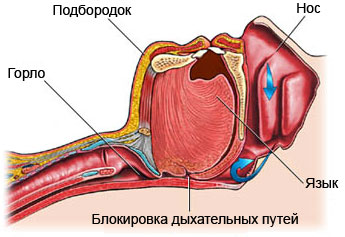Sleep apnea
Description apnea
Sleep apnea – state, in which breathing repeatedly during sleep is interrupted. Time period, during which breathing stops or decreases, usually, ranges between 10 and 30 sekundami. Frequent repetition of episodes, sleep apnea can seriously disrupt the quality of sleep.

Causes of sleep apnea
There are three types of apnea, which arise for various reasons:
- Obstructive sleep apnea – resulting from temporary, partial or complete blockage of the airway;
- Central sleep apnea – as a result of a temporary cessation of breathing (cessation of functioning of the respiratory system);
- Mixed apnea – the combination of the first two types of sleep apnea.
Risk factors for sleep apnea
Factors, that may increase the risk of sleep apnea include:
- Paul: male;
- Overweight;
- A large neck circumference;
- Age: middle and old age;
- Family history of apnea;
- Structural abnormalities of the nose, throat or other parts of the respiratory tract:
- Polyps;
- Enlarged tonsils;
- The slope of the nasal septum;
- Gipotireoz;
- Drugs: receiving sedatives and hypnotic drugs;
- Alcohol consumption;
- Smoking.
Symptoms of sleep apnea
Symptoms of apnea in a dream may include:
- Fatigue and sleepiness during waking hours;
- Loud snoring;
- Breathing stops during the night;
- Frequent waking at night;
- Morning headache;
- Poor concentration or memory problems;
- Irritability or short temper.
People with chronic untreated sleep apnea may be at risk:
- Road traffic accidents;
- Depression;
- Hypertension;
- Heart trouble.
Diagnosis of sleep apnea
For the diagnosis of sleep apnea is an overnight sleep study is used.
Overnight sleep study – Polysomnography
Overnight sleep study It helps to determine the presence and severity of sleep apnea. During sleep is measured:
- Eye movements and muscles;
- Brain activity (electroencephalogram);
- Heart rate;
- Breathing (frequency and depth);
- Percentage saturation of red blood cells with oxygen.
Other studies in the sleep apnea
In addition your doctor may prescribe polysomnography:
- Blood tests (eg, to check thyroid function);
- ECG;
- Pulmonary function tests.
Treatment of sleep apnea
There are several treatment options for sleep apnea, including:
Povedencheskaya therapy
- It is necessary to lose weight, if you are overweight;
- Avoid using sedatives, hypnotics, alcohol and nicotine. They can worsen the disorder;
- Try sleeping on your side, rather than back;
- Place the pillow in such a way, to sleep as comfortable as possible;
- When daytime sleepiness, Practice Security Measures, such as avoiding driving or operating potentially dangerous equipment.
Mechanical treatment of sleep apnea
For the treatment of sleep apnea is used to maintain a continuous positive airway pressure (CPAP). For these purposes, the mask is applied, which fits over the nose and / or mouth during sleep. Fan support is enough constant and continuous flow of air through the airways, thereby preventing tissue damage and airway blockage. In some cases, used dental instruments, that help support language or jaw in the open position.
Surgery for the treatment of sleep apnea
In some cases it may be recommended surgery. This is most useful in pediatric.
Types of operations, which may be conducted for the treatment of severe cases of sleep apnea:
- Uvulopalatofarynhoplastyka – the doctor removes excess soft tissue from the nose and / or throat;
- Bimaksilyarnaya surgery – jaw bone is moved forward;
- Tracheotomy – in life-threatening cases of sleep apnea, performed in the trachea opening, into which the breathing tube. This allows for normal breathing;
Bariatric surgery may help with weight loss in some people, are obese. This operation can reduce many complications, obesity related, including sleep apnea.
Medication during sleep apnea
It can only be used in the treatment of central sleep apnea. Aцetazolamid (Diamox) can improve the ability to regulate breathing. Generally, there is not much evidence to support the use of drugs for the treatment of sleep apnea.
If the oxygen level in the blood even after the opening of the airway drops too low, It may be assigned to treatment by supplying additional oxygen to the lungs.
Preventing sleep apnea
You can prevent the occurrence of sleep apnea, maintaining a healthy weight. Avoid alcohol, nicotine, and sedatives, which can lead to obstruction of the airway.
